Understanding Operations, Logistics and Supply Chain
VerifiedAdded on 2023/01/18
|10
|3291
|86
AI Summary
This report provides an in-depth analysis of operations, logistics, and supply chain management in the automotive industry, focusing on General Motors. It covers topics such as new product development and managing quality, with recommendations for improvement. The report also discusses the concept of triple bottom line and its importance for General Motors.
Contribute Materials
Your contribution can guide someone’s learning journey. Share your
documents today.
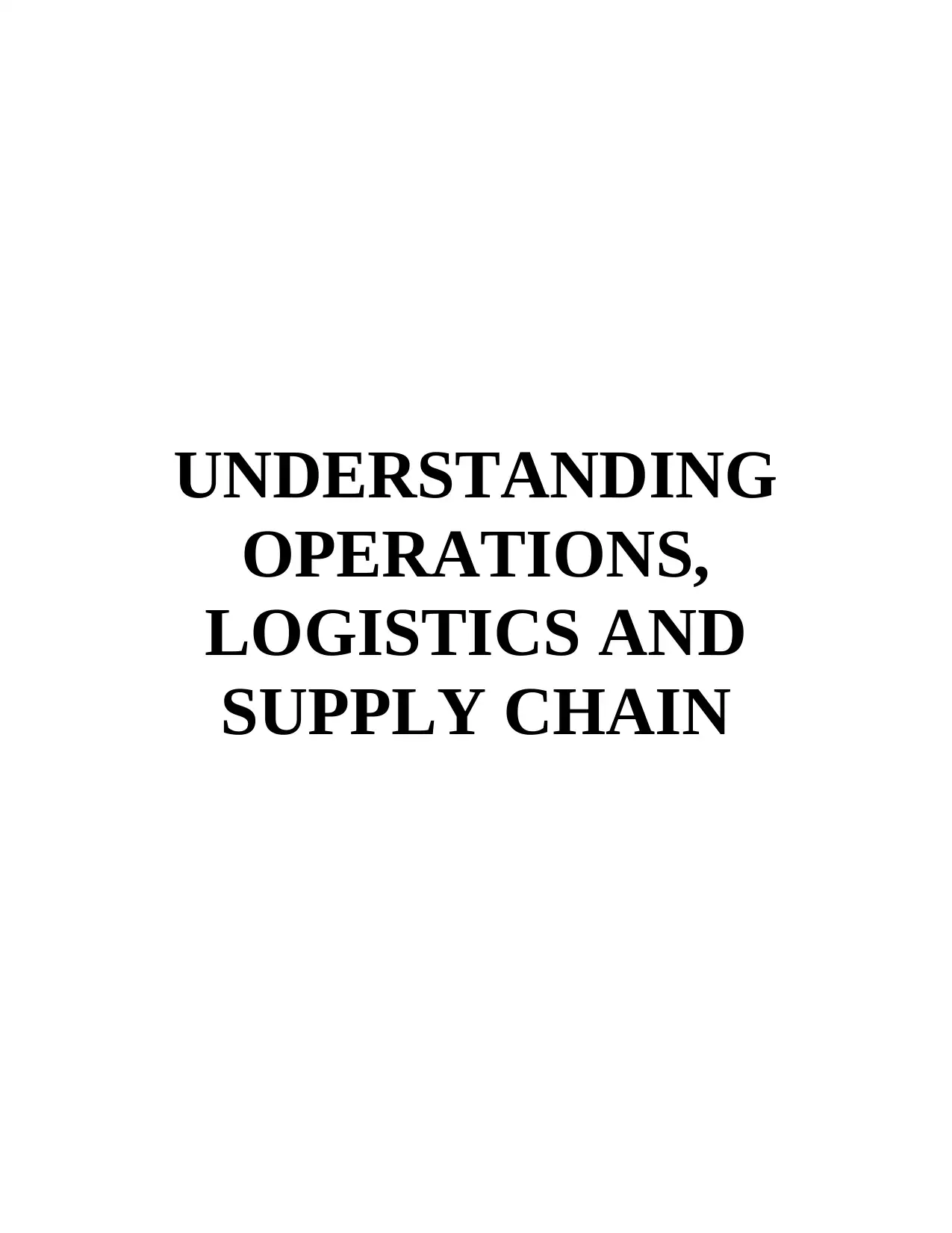
UNDERSTANDING
OPERATIONS,
LOGISTICS AND
SUPPLY CHAIN
OPERATIONS,
LOGISTICS AND
SUPPLY CHAIN
Secure Best Marks with AI Grader
Need help grading? Try our AI Grader for instant feedback on your assignments.

Table of Contents
INTRODUCTION...........................................................................................................................1
MAIN BODY...................................................................................................................................1
CONCLUSION................................................................................................................................6
REFERENCES................................................................................................................................8
INTRODUCTION...........................................................................................................................1
MAIN BODY...................................................................................................................................1
CONCLUSION................................................................................................................................6
REFERENCES................................................................................................................................8
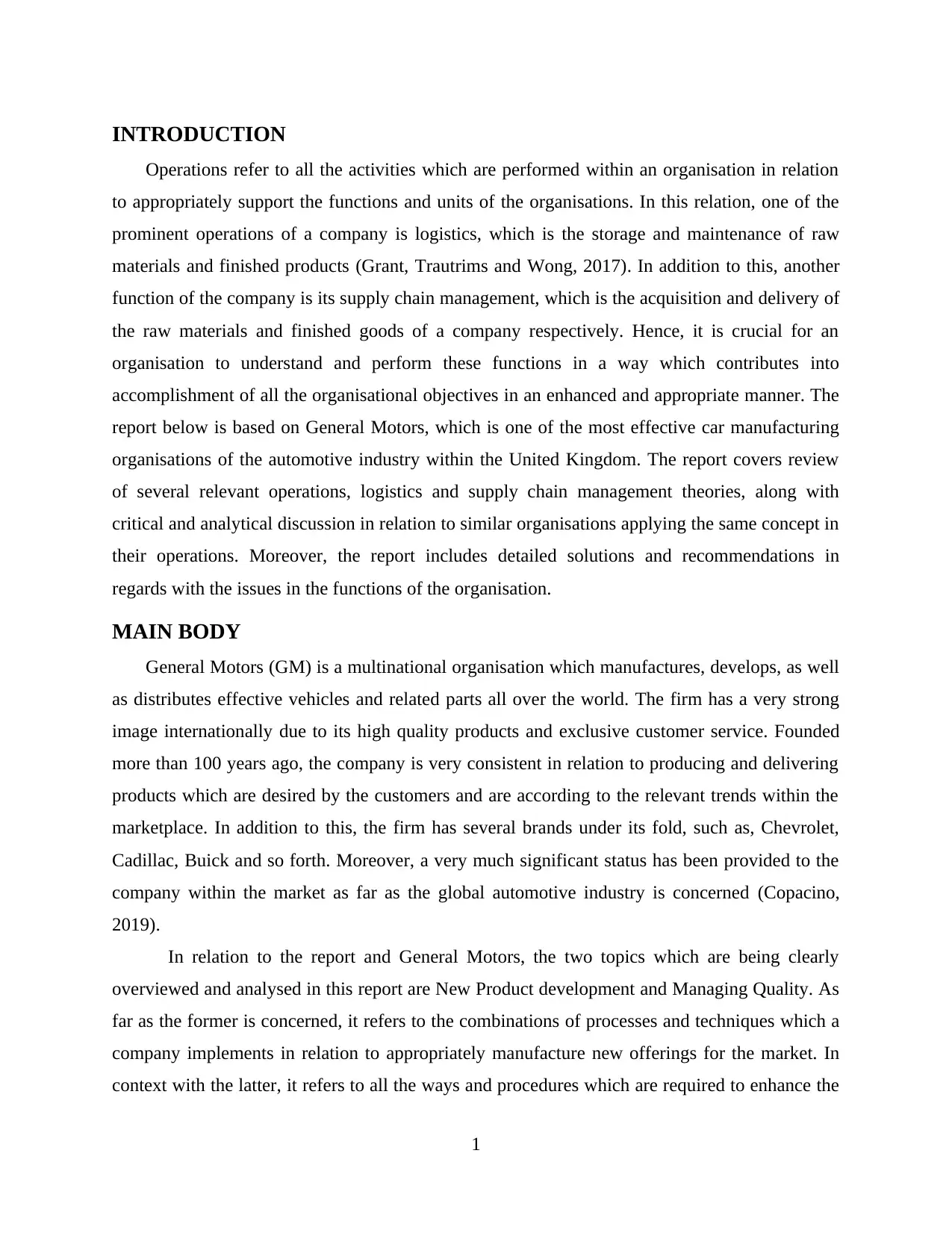
INTRODUCTION
Operations refer to all the activities which are performed within an organisation in relation
to appropriately support the functions and units of the organisations. In this relation, one of the
prominent operations of a company is logistics, which is the storage and maintenance of raw
materials and finished products (Grant, Trautrims and Wong, 2017). In addition to this, another
function of the company is its supply chain management, which is the acquisition and delivery of
the raw materials and finished goods of a company respectively. Hence, it is crucial for an
organisation to understand and perform these functions in a way which contributes into
accomplishment of all the organisational objectives in an enhanced and appropriate manner. The
report below is based on General Motors, which is one of the most effective car manufacturing
organisations of the automotive industry within the United Kingdom. The report covers review
of several relevant operations, logistics and supply chain management theories, along with
critical and analytical discussion in relation to similar organisations applying the same concept in
their operations. Moreover, the report includes detailed solutions and recommendations in
regards with the issues in the functions of the organisation.
MAIN BODY
General Motors (GM) is a multinational organisation which manufactures, develops, as well
as distributes effective vehicles and related parts all over the world. The firm has a very strong
image internationally due to its high quality products and exclusive customer service. Founded
more than 100 years ago, the company is very consistent in relation to producing and delivering
products which are desired by the customers and are according to the relevant trends within the
marketplace. In addition to this, the firm has several brands under its fold, such as, Chevrolet,
Cadillac, Buick and so forth. Moreover, a very much significant status has been provided to the
company within the market as far as the global automotive industry is concerned (Copacino,
2019).
In relation to the report and General Motors, the two topics which are being clearly
overviewed and analysed in this report are New Product development and Managing Quality. As
far as the former is concerned, it refers to the combinations of processes and techniques which a
company implements in relation to appropriately manufacture new offerings for the market. In
context with the latter, it refers to all the ways and procedures which are required to enhance the
1
Operations refer to all the activities which are performed within an organisation in relation
to appropriately support the functions and units of the organisations. In this relation, one of the
prominent operations of a company is logistics, which is the storage and maintenance of raw
materials and finished products (Grant, Trautrims and Wong, 2017). In addition to this, another
function of the company is its supply chain management, which is the acquisition and delivery of
the raw materials and finished goods of a company respectively. Hence, it is crucial for an
organisation to understand and perform these functions in a way which contributes into
accomplishment of all the organisational objectives in an enhanced and appropriate manner. The
report below is based on General Motors, which is one of the most effective car manufacturing
organisations of the automotive industry within the United Kingdom. The report covers review
of several relevant operations, logistics and supply chain management theories, along with
critical and analytical discussion in relation to similar organisations applying the same concept in
their operations. Moreover, the report includes detailed solutions and recommendations in
regards with the issues in the functions of the organisation.
MAIN BODY
General Motors (GM) is a multinational organisation which manufactures, develops, as well
as distributes effective vehicles and related parts all over the world. The firm has a very strong
image internationally due to its high quality products and exclusive customer service. Founded
more than 100 years ago, the company is very consistent in relation to producing and delivering
products which are desired by the customers and are according to the relevant trends within the
marketplace. In addition to this, the firm has several brands under its fold, such as, Chevrolet,
Cadillac, Buick and so forth. Moreover, a very much significant status has been provided to the
company within the market as far as the global automotive industry is concerned (Copacino,
2019).
In relation to the report and General Motors, the two topics which are being clearly
overviewed and analysed in this report are New Product development and Managing Quality. As
far as the former is concerned, it refers to the combinations of processes and techniques which a
company implements in relation to appropriately manufacture new offerings for the market. In
context with the latter, it refers to all the ways and procedures which are required to enhance the
1
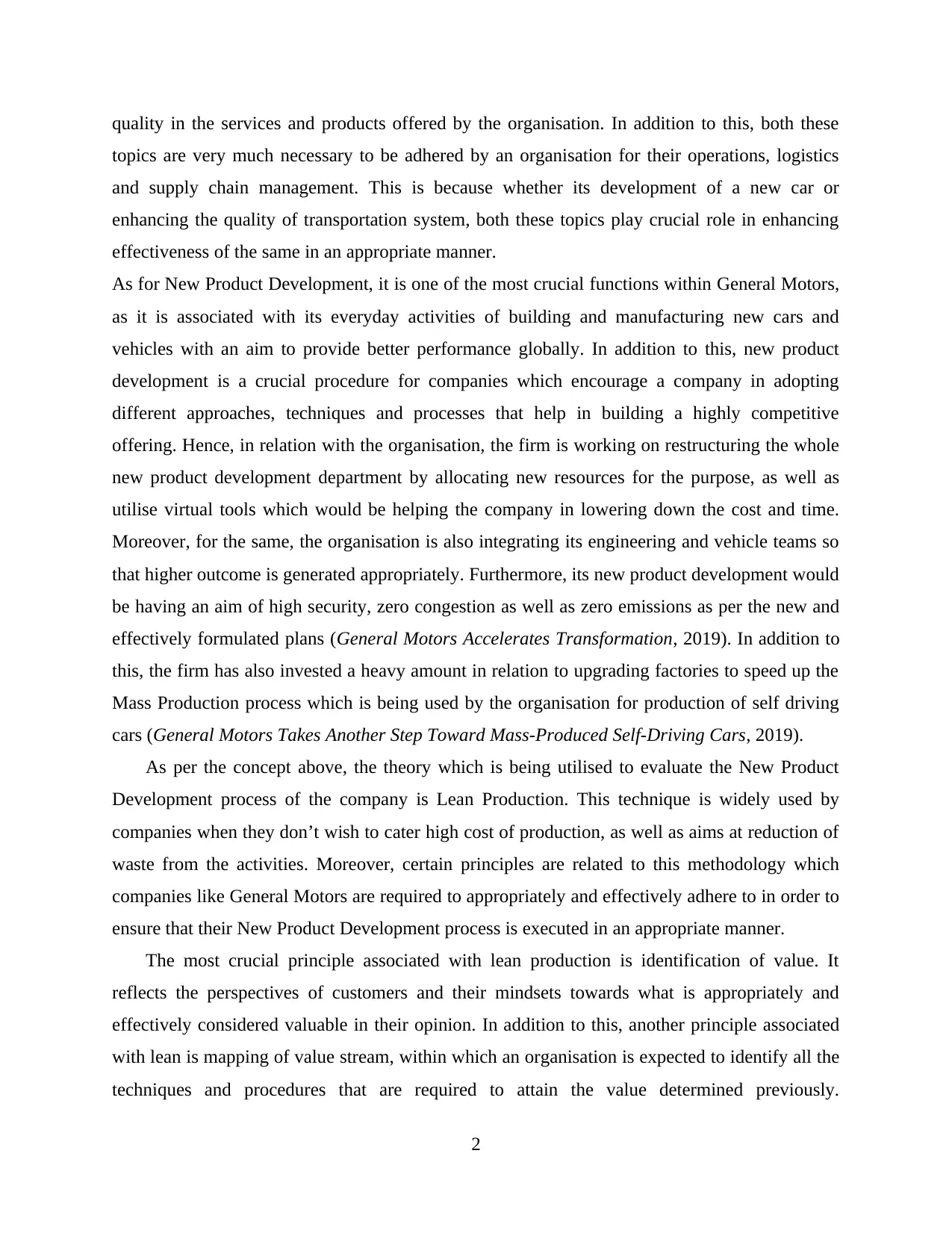
quality in the services and products offered by the organisation. In addition to this, both these
topics are very much necessary to be adhered by an organisation for their operations, logistics
and supply chain management. This is because whether its development of a new car or
enhancing the quality of transportation system, both these topics play crucial role in enhancing
effectiveness of the same in an appropriate manner.
As for New Product Development, it is one of the most crucial functions within General Motors,
as it is associated with its everyday activities of building and manufacturing new cars and
vehicles with an aim to provide better performance globally. In addition to this, new product
development is a crucial procedure for companies which encourage a company in adopting
different approaches, techniques and processes that help in building a highly competitive
offering. Hence, in relation with the organisation, the firm is working on restructuring the whole
new product development department by allocating new resources for the purpose, as well as
utilise virtual tools which would be helping the company in lowering down the cost and time.
Moreover, for the same, the organisation is also integrating its engineering and vehicle teams so
that higher outcome is generated appropriately. Furthermore, its new product development would
be having an aim of high security, zero congestion as well as zero emissions as per the new and
effectively formulated plans (General Motors Accelerates Transformation, 2019). In addition to
this, the firm has also invested a heavy amount in relation to upgrading factories to speed up the
Mass Production process which is being used by the organisation for production of self driving
cars (General Motors Takes Another Step Toward Mass-Produced Self-Driving Cars, 2019).
As per the concept above, the theory which is being utilised to evaluate the New Product
Development process of the company is Lean Production. This technique is widely used by
companies when they don’t wish to cater high cost of production, as well as aims at reduction of
waste from the activities. Moreover, certain principles are related to this methodology which
companies like General Motors are required to appropriately and effectively adhere to in order to
ensure that their New Product Development process is executed in an appropriate manner.
The most crucial principle associated with lean production is identification of value. It
reflects the perspectives of customers and their mindsets towards what is appropriately and
effectively considered valuable in their opinion. In addition to this, another principle associated
with lean is mapping of value stream, within which an organisation is expected to identify all the
techniques and procedures that are required to attain the value determined previously.
2
topics are very much necessary to be adhered by an organisation for their operations, logistics
and supply chain management. This is because whether its development of a new car or
enhancing the quality of transportation system, both these topics play crucial role in enhancing
effectiveness of the same in an appropriate manner.
As for New Product Development, it is one of the most crucial functions within General Motors,
as it is associated with its everyday activities of building and manufacturing new cars and
vehicles with an aim to provide better performance globally. In addition to this, new product
development is a crucial procedure for companies which encourage a company in adopting
different approaches, techniques and processes that help in building a highly competitive
offering. Hence, in relation with the organisation, the firm is working on restructuring the whole
new product development department by allocating new resources for the purpose, as well as
utilise virtual tools which would be helping the company in lowering down the cost and time.
Moreover, for the same, the organisation is also integrating its engineering and vehicle teams so
that higher outcome is generated appropriately. Furthermore, its new product development would
be having an aim of high security, zero congestion as well as zero emissions as per the new and
effectively formulated plans (General Motors Accelerates Transformation, 2019). In addition to
this, the firm has also invested a heavy amount in relation to upgrading factories to speed up the
Mass Production process which is being used by the organisation for production of self driving
cars (General Motors Takes Another Step Toward Mass-Produced Self-Driving Cars, 2019).
As per the concept above, the theory which is being utilised to evaluate the New Product
Development process of the company is Lean Production. This technique is widely used by
companies when they don’t wish to cater high cost of production, as well as aims at reduction of
waste from the activities. Moreover, certain principles are related to this methodology which
companies like General Motors are required to appropriately and effectively adhere to in order to
ensure that their New Product Development process is executed in an appropriate manner.
The most crucial principle associated with lean production is identification of value. It
reflects the perspectives of customers and their mindsets towards what is appropriately and
effectively considered valuable in their opinion. In addition to this, another principle associated
with lean is mapping of value stream, within which an organisation is expected to identify all the
techniques and procedures that are required to attain the value determined previously.
2
Secure Best Marks with AI Grader
Need help grading? Try our AI Grader for instant feedback on your assignments.
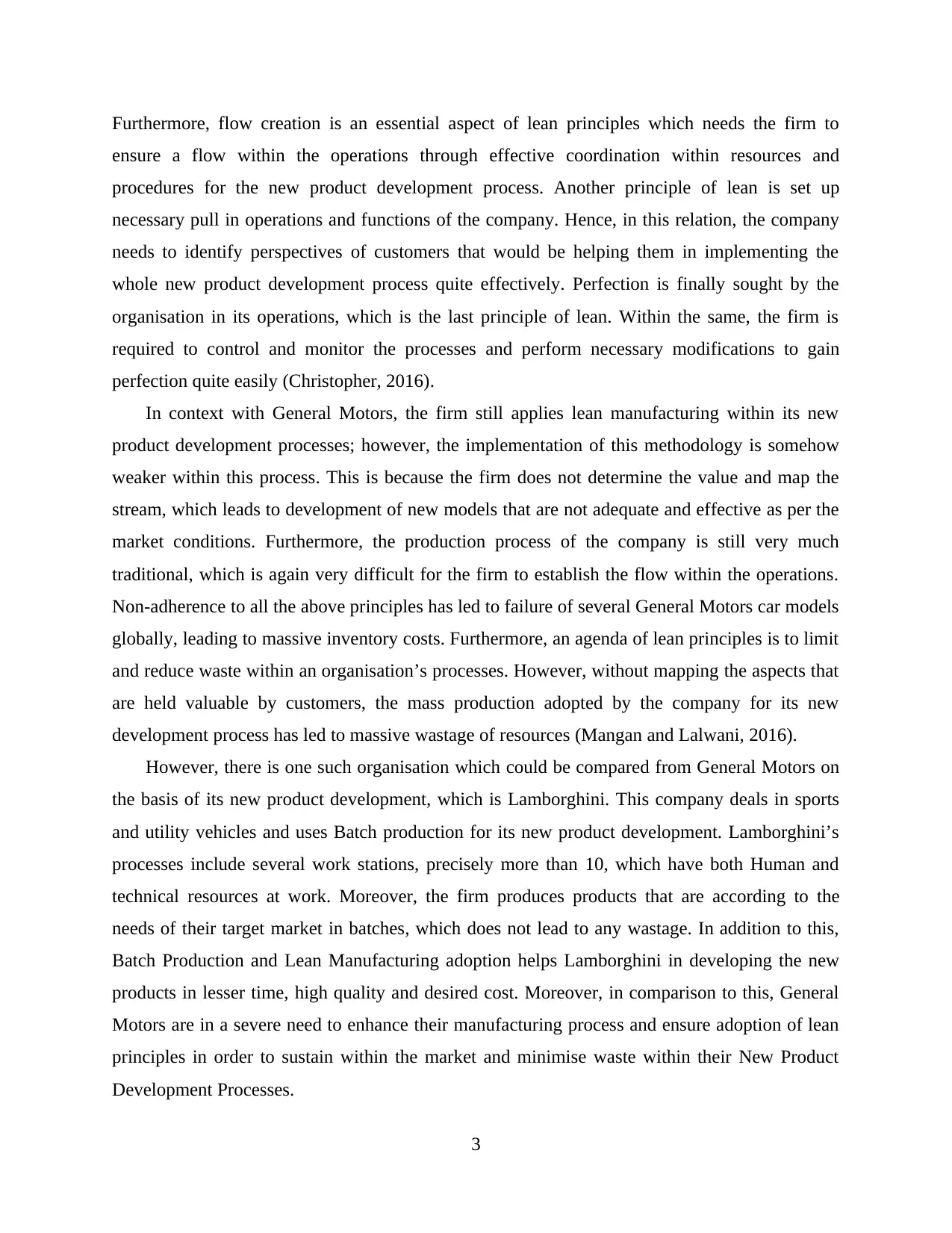
Furthermore, flow creation is an essential aspect of lean principles which needs the firm to
ensure a flow within the operations through effective coordination within resources and
procedures for the new product development process. Another principle of lean is set up
necessary pull in operations and functions of the company. Hence, in this relation, the company
needs to identify perspectives of customers that would be helping them in implementing the
whole new product development process quite effectively. Perfection is finally sought by the
organisation in its operations, which is the last principle of lean. Within the same, the firm is
required to control and monitor the processes and perform necessary modifications to gain
perfection quite easily (Christopher, 2016).
In context with General Motors, the firm still applies lean manufacturing within its new
product development processes; however, the implementation of this methodology is somehow
weaker within this process. This is because the firm does not determine the value and map the
stream, which leads to development of new models that are not adequate and effective as per the
market conditions. Furthermore, the production process of the company is still very much
traditional, which is again very difficult for the firm to establish the flow within the operations.
Non-adherence to all the above principles has led to failure of several General Motors car models
globally, leading to massive inventory costs. Furthermore, an agenda of lean principles is to limit
and reduce waste within an organisation’s processes. However, without mapping the aspects that
are held valuable by customers, the mass production adopted by the company for its new
development process has led to massive wastage of resources (Mangan and Lalwani, 2016).
However, there is one such organisation which could be compared from General Motors on
the basis of its new product development, which is Lamborghini. This company deals in sports
and utility vehicles and uses Batch production for its new product development. Lamborghini’s
processes include several work stations, precisely more than 10, which have both Human and
technical resources at work. Moreover, the firm produces products that are according to the
needs of their target market in batches, which does not lead to any wastage. In addition to this,
Batch Production and Lean Manufacturing adoption helps Lamborghini in developing the new
products in lesser time, high quality and desired cost. Moreover, in comparison to this, General
Motors are in a severe need to enhance their manufacturing process and ensure adoption of lean
principles in order to sustain within the market and minimise waste within their New Product
Development Processes.
3
ensure a flow within the operations through effective coordination within resources and
procedures for the new product development process. Another principle of lean is set up
necessary pull in operations and functions of the company. Hence, in this relation, the company
needs to identify perspectives of customers that would be helping them in implementing the
whole new product development process quite effectively. Perfection is finally sought by the
organisation in its operations, which is the last principle of lean. Within the same, the firm is
required to control and monitor the processes and perform necessary modifications to gain
perfection quite easily (Christopher, 2016).
In context with General Motors, the firm still applies lean manufacturing within its new
product development processes; however, the implementation of this methodology is somehow
weaker within this process. This is because the firm does not determine the value and map the
stream, which leads to development of new models that are not adequate and effective as per the
market conditions. Furthermore, the production process of the company is still very much
traditional, which is again very difficult for the firm to establish the flow within the operations.
Non-adherence to all the above principles has led to failure of several General Motors car models
globally, leading to massive inventory costs. Furthermore, an agenda of lean principles is to limit
and reduce waste within an organisation’s processes. However, without mapping the aspects that
are held valuable by customers, the mass production adopted by the company for its new
development process has led to massive wastage of resources (Mangan and Lalwani, 2016).
However, there is one such organisation which could be compared from General Motors on
the basis of its new product development, which is Lamborghini. This company deals in sports
and utility vehicles and uses Batch production for its new product development. Lamborghini’s
processes include several work stations, precisely more than 10, which have both Human and
technical resources at work. Moreover, the firm produces products that are according to the
needs of their target market in batches, which does not lead to any wastage. In addition to this,
Batch Production and Lean Manufacturing adoption helps Lamborghini in developing the new
products in lesser time, high quality and desired cost. Moreover, in comparison to this, General
Motors are in a severe need to enhance their manufacturing process and ensure adoption of lean
principles in order to sustain within the market and minimise waste within their New Product
Development Processes.
3
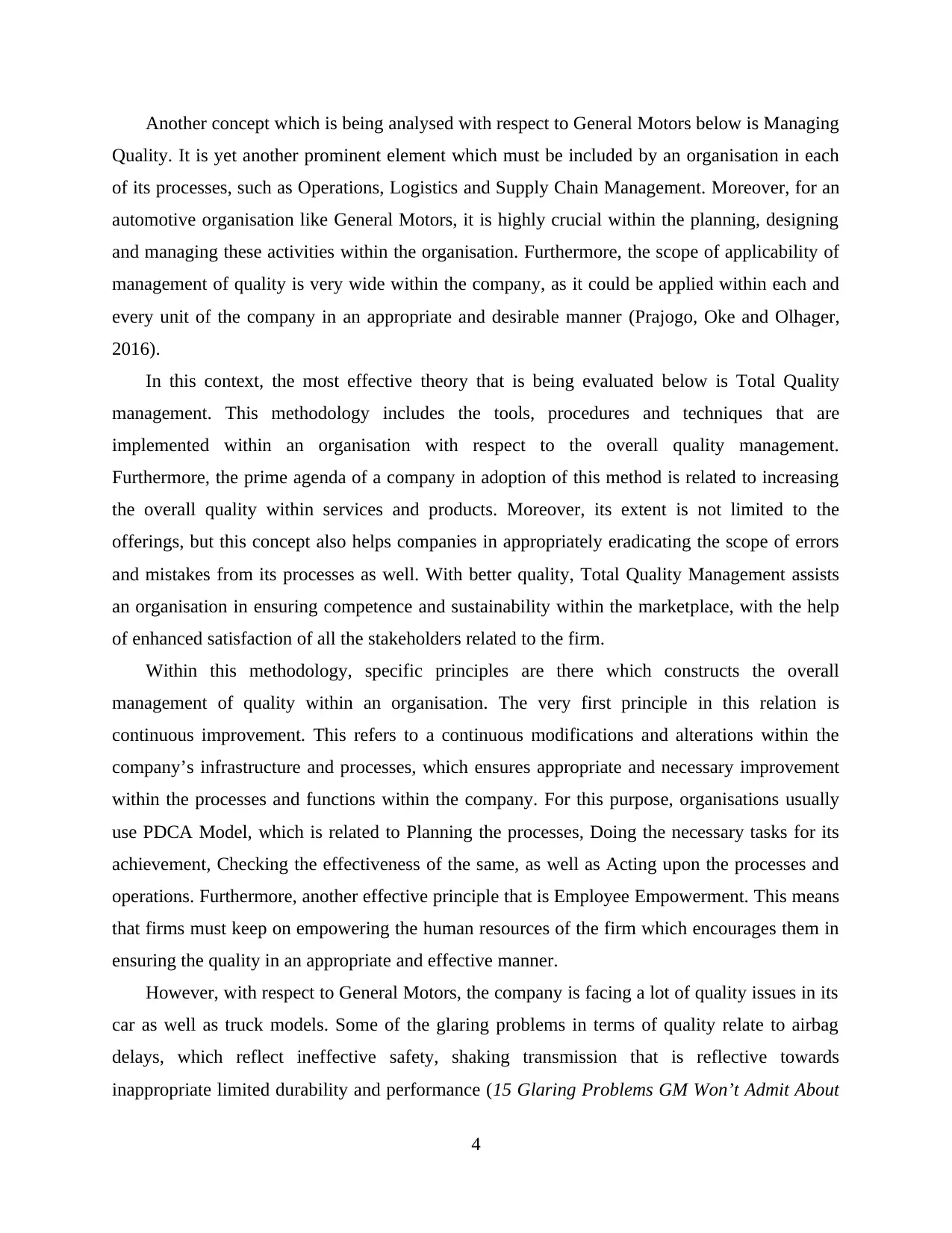
Another concept which is being analysed with respect to General Motors below is Managing
Quality. It is yet another prominent element which must be included by an organisation in each
of its processes, such as Operations, Logistics and Supply Chain Management. Moreover, for an
automotive organisation like General Motors, it is highly crucial within the planning, designing
and managing these activities within the organisation. Furthermore, the scope of applicability of
management of quality is very wide within the company, as it could be applied within each and
every unit of the company in an appropriate and desirable manner (Prajogo, Oke and Olhager,
2016).
In this context, the most effective theory that is being evaluated below is Total Quality
management. This methodology includes the tools, procedures and techniques that are
implemented within an organisation with respect to the overall quality management.
Furthermore, the prime agenda of a company in adoption of this method is related to increasing
the overall quality within services and products. Moreover, its extent is not limited to the
offerings, but this concept also helps companies in appropriately eradicating the scope of errors
and mistakes from its processes as well. With better quality, Total Quality Management assists
an organisation in ensuring competence and sustainability within the marketplace, with the help
of enhanced satisfaction of all the stakeholders related to the firm.
Within this methodology, specific principles are there which constructs the overall
management of quality within an organisation. The very first principle in this relation is
continuous improvement. This refers to a continuous modifications and alterations within the
company’s infrastructure and processes, which ensures appropriate and necessary improvement
within the processes and functions within the company. For this purpose, organisations usually
use PDCA Model, which is related to Planning the processes, Doing the necessary tasks for its
achievement, Checking the effectiveness of the same, as well as Acting upon the processes and
operations. Furthermore, another effective principle that is Employee Empowerment. This means
that firms must keep on empowering the human resources of the firm which encourages them in
ensuring the quality in an appropriate and effective manner.
However, with respect to General Motors, the company is facing a lot of quality issues in its
car as well as truck models. Some of the glaring problems in terms of quality relate to airbag
delays, which reflect ineffective safety, shaking transmission that is reflective towards
inappropriate limited durability and performance (15 Glaring Problems GM Won’t Admit About
4
Quality. It is yet another prominent element which must be included by an organisation in each
of its processes, such as Operations, Logistics and Supply Chain Management. Moreover, for an
automotive organisation like General Motors, it is highly crucial within the planning, designing
and managing these activities within the organisation. Furthermore, the scope of applicability of
management of quality is very wide within the company, as it could be applied within each and
every unit of the company in an appropriate and desirable manner (Prajogo, Oke and Olhager,
2016).
In this context, the most effective theory that is being evaluated below is Total Quality
management. This methodology includes the tools, procedures and techniques that are
implemented within an organisation with respect to the overall quality management.
Furthermore, the prime agenda of a company in adoption of this method is related to increasing
the overall quality within services and products. Moreover, its extent is not limited to the
offerings, but this concept also helps companies in appropriately eradicating the scope of errors
and mistakes from its processes as well. With better quality, Total Quality Management assists
an organisation in ensuring competence and sustainability within the marketplace, with the help
of enhanced satisfaction of all the stakeholders related to the firm.
Within this methodology, specific principles are there which constructs the overall
management of quality within an organisation. The very first principle in this relation is
continuous improvement. This refers to a continuous modifications and alterations within the
company’s infrastructure and processes, which ensures appropriate and necessary improvement
within the processes and functions within the company. For this purpose, organisations usually
use PDCA Model, which is related to Planning the processes, Doing the necessary tasks for its
achievement, Checking the effectiveness of the same, as well as Acting upon the processes and
operations. Furthermore, another effective principle that is Employee Empowerment. This means
that firms must keep on empowering the human resources of the firm which encourages them in
ensuring the quality in an appropriate and effective manner.
However, with respect to General Motors, the company is facing a lot of quality issues in its
car as well as truck models. Some of the glaring problems in terms of quality relate to airbag
delays, which reflect ineffective safety, shaking transmission that is reflective towards
inappropriate limited durability and performance (15 Glaring Problems GM Won’t Admit About
4
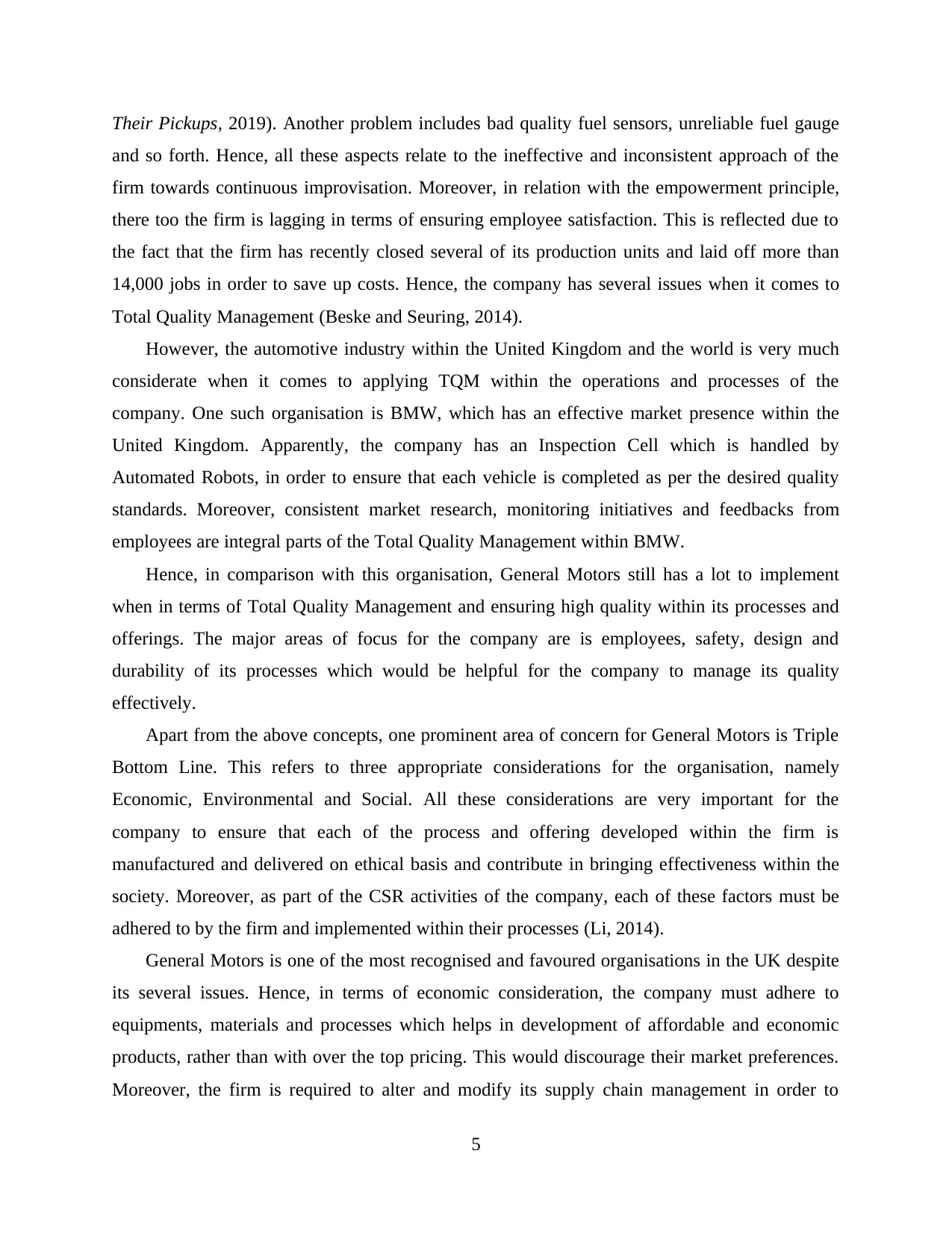
Their Pickups, 2019). Another problem includes bad quality fuel sensors, unreliable fuel gauge
and so forth. Hence, all these aspects relate to the ineffective and inconsistent approach of the
firm towards continuous improvisation. Moreover, in relation with the empowerment principle,
there too the firm is lagging in terms of ensuring employee satisfaction. This is reflected due to
the fact that the firm has recently closed several of its production units and laid off more than
14,000 jobs in order to save up costs. Hence, the company has several issues when it comes to
Total Quality Management (Beske and Seuring, 2014).
However, the automotive industry within the United Kingdom and the world is very much
considerate when it comes to applying TQM within the operations and processes of the
company. One such organisation is BMW, which has an effective market presence within the
United Kingdom. Apparently, the company has an Inspection Cell which is handled by
Automated Robots, in order to ensure that each vehicle is completed as per the desired quality
standards. Moreover, consistent market research, monitoring initiatives and feedbacks from
employees are integral parts of the Total Quality Management within BMW.
Hence, in comparison with this organisation, General Motors still has a lot to implement
when in terms of Total Quality Management and ensuring high quality within its processes and
offerings. The major areas of focus for the company are is employees, safety, design and
durability of its processes which would be helpful for the company to manage its quality
effectively.
Apart from the above concepts, one prominent area of concern for General Motors is Triple
Bottom Line. This refers to three appropriate considerations for the organisation, namely
Economic, Environmental and Social. All these considerations are very important for the
company to ensure that each of the process and offering developed within the firm is
manufactured and delivered on ethical basis and contribute in bringing effectiveness within the
society. Moreover, as part of the CSR activities of the company, each of these factors must be
adhered to by the firm and implemented within their processes (Li, 2014).
General Motors is one of the most recognised and favoured organisations in the UK despite
its several issues. Hence, in terms of economic consideration, the company must adhere to
equipments, materials and processes which helps in development of affordable and economic
products, rather than with over the top pricing. This would discourage their market preferences.
Moreover, the firm is required to alter and modify its supply chain management in order to
5
and so forth. Hence, all these aspects relate to the ineffective and inconsistent approach of the
firm towards continuous improvisation. Moreover, in relation with the empowerment principle,
there too the firm is lagging in terms of ensuring employee satisfaction. This is reflected due to
the fact that the firm has recently closed several of its production units and laid off more than
14,000 jobs in order to save up costs. Hence, the company has several issues when it comes to
Total Quality Management (Beske and Seuring, 2014).
However, the automotive industry within the United Kingdom and the world is very much
considerate when it comes to applying TQM within the operations and processes of the
company. One such organisation is BMW, which has an effective market presence within the
United Kingdom. Apparently, the company has an Inspection Cell which is handled by
Automated Robots, in order to ensure that each vehicle is completed as per the desired quality
standards. Moreover, consistent market research, monitoring initiatives and feedbacks from
employees are integral parts of the Total Quality Management within BMW.
Hence, in comparison with this organisation, General Motors still has a lot to implement
when in terms of Total Quality Management and ensuring high quality within its processes and
offerings. The major areas of focus for the company are is employees, safety, design and
durability of its processes which would be helpful for the company to manage its quality
effectively.
Apart from the above concepts, one prominent area of concern for General Motors is Triple
Bottom Line. This refers to three appropriate considerations for the organisation, namely
Economic, Environmental and Social. All these considerations are very important for the
company to ensure that each of the process and offering developed within the firm is
manufactured and delivered on ethical basis and contribute in bringing effectiveness within the
society. Moreover, as part of the CSR activities of the company, each of these factors must be
adhered to by the firm and implemented within their processes (Li, 2014).
General Motors is one of the most recognised and favoured organisations in the UK despite
its several issues. Hence, in terms of economic consideration, the company must adhere to
equipments, materials and processes which helps in development of affordable and economic
products, rather than with over the top pricing. This would discourage their market preferences.
Moreover, the firm is required to alter and modify its supply chain management in order to
5
Paraphrase This Document
Need a fresh take? Get an instant paraphrase of this document with our AI Paraphraser
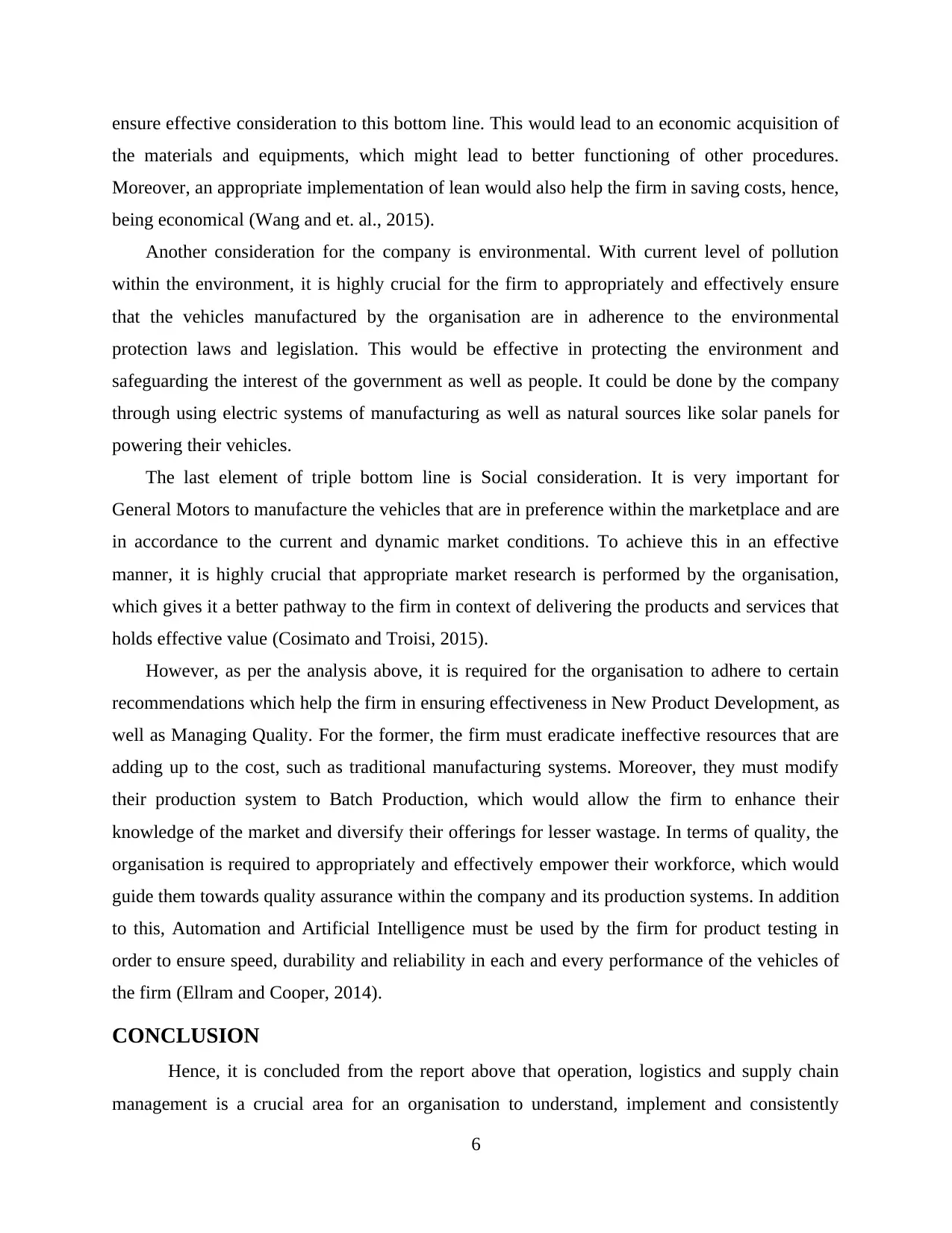
ensure effective consideration to this bottom line. This would lead to an economic acquisition of
the materials and equipments, which might lead to better functioning of other procedures.
Moreover, an appropriate implementation of lean would also help the firm in saving costs, hence,
being economical (Wang and et. al., 2015).
Another consideration for the company is environmental. With current level of pollution
within the environment, it is highly crucial for the firm to appropriately and effectively ensure
that the vehicles manufactured by the organisation are in adherence to the environmental
protection laws and legislation. This would be effective in protecting the environment and
safeguarding the interest of the government as well as people. It could be done by the company
through using electric systems of manufacturing as well as natural sources like solar panels for
powering their vehicles.
The last element of triple bottom line is Social consideration. It is very important for
General Motors to manufacture the vehicles that are in preference within the marketplace and are
in accordance to the current and dynamic market conditions. To achieve this in an effective
manner, it is highly crucial that appropriate market research is performed by the organisation,
which gives it a better pathway to the firm in context of delivering the products and services that
holds effective value (Cosimato and Troisi, 2015).
However, as per the analysis above, it is required for the organisation to adhere to certain
recommendations which help the firm in ensuring effectiveness in New Product Development, as
well as Managing Quality. For the former, the firm must eradicate ineffective resources that are
adding up to the cost, such as traditional manufacturing systems. Moreover, they must modify
their production system to Batch Production, which would allow the firm to enhance their
knowledge of the market and diversify their offerings for lesser wastage. In terms of quality, the
organisation is required to appropriately and effectively empower their workforce, which would
guide them towards quality assurance within the company and its production systems. In addition
to this, Automation and Artificial Intelligence must be used by the firm for product testing in
order to ensure speed, durability and reliability in each and every performance of the vehicles of
the firm (Ellram and Cooper, 2014).
CONCLUSION
Hence, it is concluded from the report above that operation, logistics and supply chain
management is a crucial area for an organisation to understand, implement and consistently
6
the materials and equipments, which might lead to better functioning of other procedures.
Moreover, an appropriate implementation of lean would also help the firm in saving costs, hence,
being economical (Wang and et. al., 2015).
Another consideration for the company is environmental. With current level of pollution
within the environment, it is highly crucial for the firm to appropriately and effectively ensure
that the vehicles manufactured by the organisation are in adherence to the environmental
protection laws and legislation. This would be effective in protecting the environment and
safeguarding the interest of the government as well as people. It could be done by the company
through using electric systems of manufacturing as well as natural sources like solar panels for
powering their vehicles.
The last element of triple bottom line is Social consideration. It is very important for
General Motors to manufacture the vehicles that are in preference within the marketplace and are
in accordance to the current and dynamic market conditions. To achieve this in an effective
manner, it is highly crucial that appropriate market research is performed by the organisation,
which gives it a better pathway to the firm in context of delivering the products and services that
holds effective value (Cosimato and Troisi, 2015).
However, as per the analysis above, it is required for the organisation to adhere to certain
recommendations which help the firm in ensuring effectiveness in New Product Development, as
well as Managing Quality. For the former, the firm must eradicate ineffective resources that are
adding up to the cost, such as traditional manufacturing systems. Moreover, they must modify
their production system to Batch Production, which would allow the firm to enhance their
knowledge of the market and diversify their offerings for lesser wastage. In terms of quality, the
organisation is required to appropriately and effectively empower their workforce, which would
guide them towards quality assurance within the company and its production systems. In addition
to this, Automation and Artificial Intelligence must be used by the firm for product testing in
order to ensure speed, durability and reliability in each and every performance of the vehicles of
the firm (Ellram and Cooper, 2014).
CONCLUSION
Hence, it is concluded from the report above that operation, logistics and supply chain
management is a crucial area for an organisation to understand, implement and consistently
6
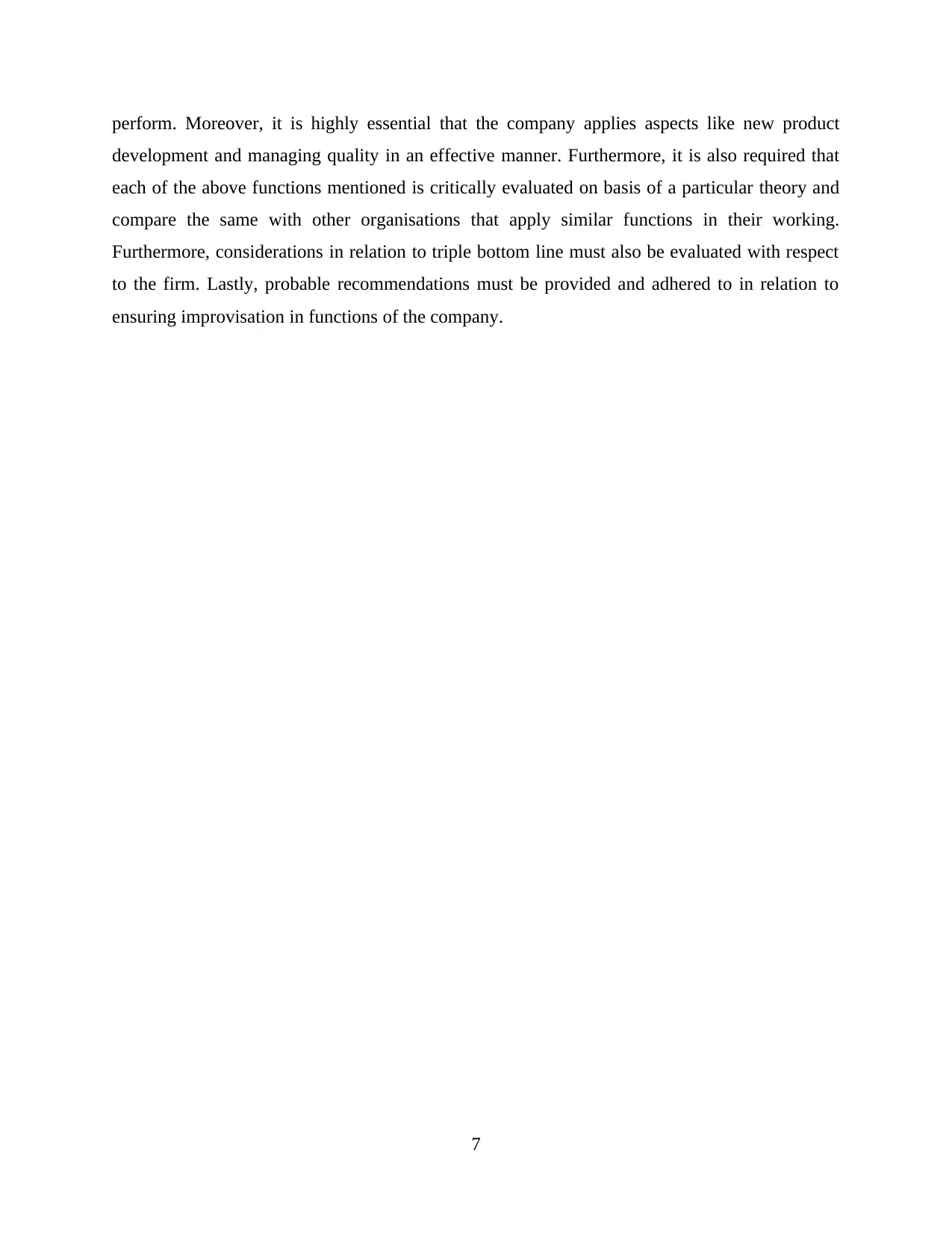
perform. Moreover, it is highly essential that the company applies aspects like new product
development and managing quality in an effective manner. Furthermore, it is also required that
each of the above functions mentioned is critically evaluated on basis of a particular theory and
compare the same with other organisations that apply similar functions in their working.
Furthermore, considerations in relation to triple bottom line must also be evaluated with respect
to the firm. Lastly, probable recommendations must be provided and adhered to in relation to
ensuring improvisation in functions of the company.
7
development and managing quality in an effective manner. Furthermore, it is also required that
each of the above functions mentioned is critically evaluated on basis of a particular theory and
compare the same with other organisations that apply similar functions in their working.
Furthermore, considerations in relation to triple bottom line must also be evaluated with respect
to the firm. Lastly, probable recommendations must be provided and adhered to in relation to
ensuring improvisation in functions of the company.
7
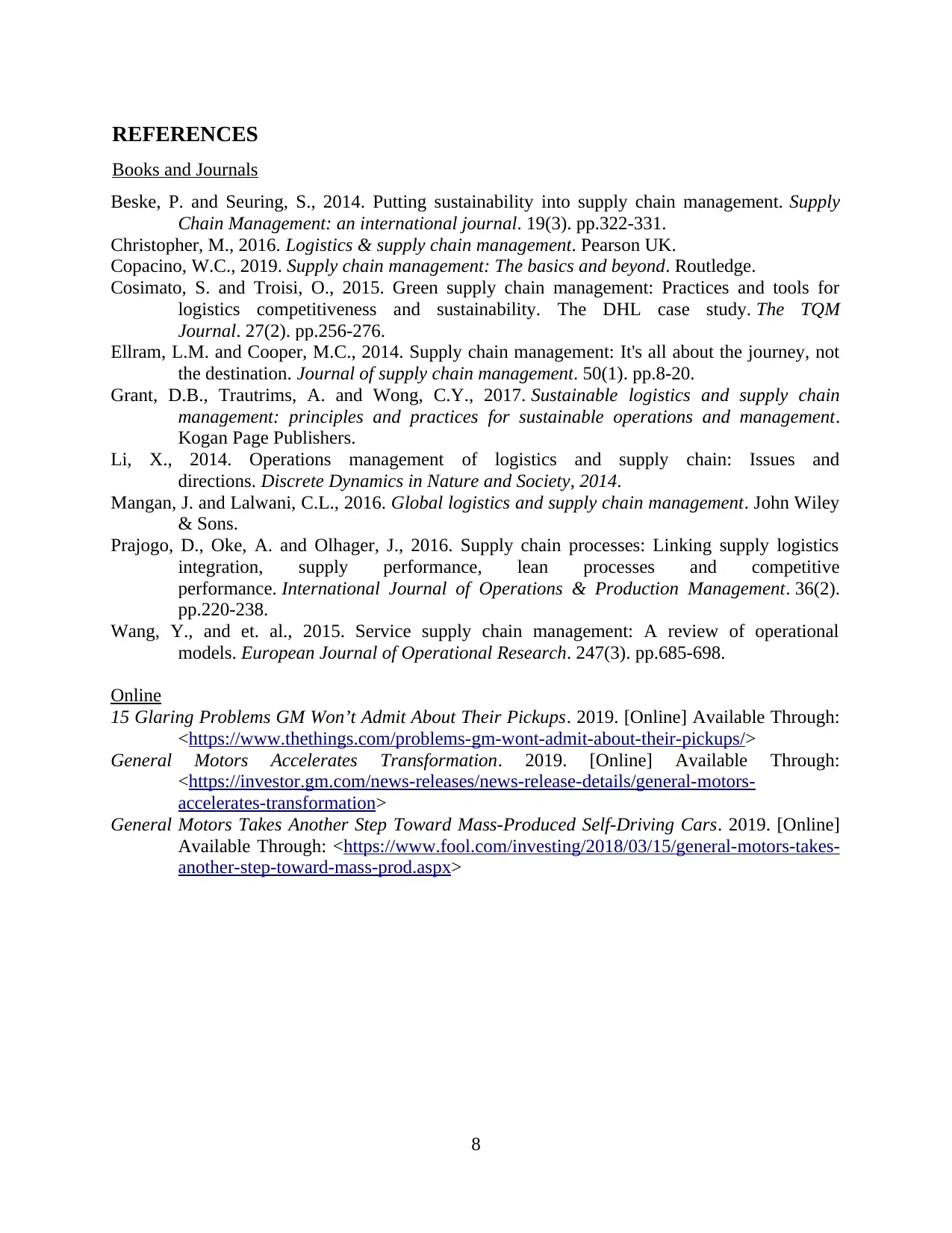
REFERENCES
Books and Journals
Beske, P. and Seuring, S., 2014. Putting sustainability into supply chain management. Supply
Chain Management: an international journal. 19(3). pp.322-331.
Christopher, M., 2016. Logistics & supply chain management. Pearson UK.
Copacino, W.C., 2019. Supply chain management: The basics and beyond. Routledge.
Cosimato, S. and Troisi, O., 2015. Green supply chain management: Practices and tools for
logistics competitiveness and sustainability. The DHL case study. The TQM
Journal. 27(2). pp.256-276.
Ellram, L.M. and Cooper, M.C., 2014. Supply chain management: It's all about the journey, not
the destination. Journal of supply chain management. 50(1). pp.8-20.
Grant, D.B., Trautrims, A. and Wong, C.Y., 2017. Sustainable logistics and supply chain
management: principles and practices for sustainable operations and management.
Kogan Page Publishers.
Li, X., 2014. Operations management of logistics and supply chain: Issues and
directions. Discrete Dynamics in Nature and Society, 2014.
Mangan, J. and Lalwani, C.L., 2016. Global logistics and supply chain management. John Wiley
& Sons.
Prajogo, D., Oke, A. and Olhager, J., 2016. Supply chain processes: Linking supply logistics
integration, supply performance, lean processes and competitive
performance. International Journal of Operations & Production Management. 36(2).
pp.220-238.
Wang, Y., and et. al., 2015. Service supply chain management: A review of operational
models. European Journal of Operational Research. 247(3). pp.685-698.
Online
15 Glaring Problems GM Won’t Admit About Their Pickups. 2019. [Online] Available Through:
<https://www.thethings.com/problems-gm-wont-admit-about-their-pickups/>
General Motors Accelerates Transformation. 2019. [Online] Available Through:
<https://investor.gm.com/news-releases/news-release-details/general-motors-
accelerates-transformation>
General Motors Takes Another Step Toward Mass-Produced Self-Driving Cars. 2019. [Online]
Available Through: <https://www.fool.com/investing/2018/03/15/general-motors-takes-
another-step-toward-mass-prod.aspx>
8
Books and Journals
Beske, P. and Seuring, S., 2014. Putting sustainability into supply chain management. Supply
Chain Management: an international journal. 19(3). pp.322-331.
Christopher, M., 2016. Logistics & supply chain management. Pearson UK.
Copacino, W.C., 2019. Supply chain management: The basics and beyond. Routledge.
Cosimato, S. and Troisi, O., 2015. Green supply chain management: Practices and tools for
logistics competitiveness and sustainability. The DHL case study. The TQM
Journal. 27(2). pp.256-276.
Ellram, L.M. and Cooper, M.C., 2014. Supply chain management: It's all about the journey, not
the destination. Journal of supply chain management. 50(1). pp.8-20.
Grant, D.B., Trautrims, A. and Wong, C.Y., 2017. Sustainable logistics and supply chain
management: principles and practices for sustainable operations and management.
Kogan Page Publishers.
Li, X., 2014. Operations management of logistics and supply chain: Issues and
directions. Discrete Dynamics in Nature and Society, 2014.
Mangan, J. and Lalwani, C.L., 2016. Global logistics and supply chain management. John Wiley
& Sons.
Prajogo, D., Oke, A. and Olhager, J., 2016. Supply chain processes: Linking supply logistics
integration, supply performance, lean processes and competitive
performance. International Journal of Operations & Production Management. 36(2).
pp.220-238.
Wang, Y., and et. al., 2015. Service supply chain management: A review of operational
models. European Journal of Operational Research. 247(3). pp.685-698.
Online
15 Glaring Problems GM Won’t Admit About Their Pickups. 2019. [Online] Available Through:
<https://www.thethings.com/problems-gm-wont-admit-about-their-pickups/>
General Motors Accelerates Transformation. 2019. [Online] Available Through:
<https://investor.gm.com/news-releases/news-release-details/general-motors-
accelerates-transformation>
General Motors Takes Another Step Toward Mass-Produced Self-Driving Cars. 2019. [Online]
Available Through: <https://www.fool.com/investing/2018/03/15/general-motors-takes-
another-step-toward-mass-prod.aspx>
8
1 out of 10
Related Documents
Your All-in-One AI-Powered Toolkit for Academic Success.
+13062052269
info@desklib.com
Available 24*7 on WhatsApp / Email
![[object Object]](/_next/static/media/star-bottom.7253800d.svg)
Unlock your academic potential
© 2024 | Zucol Services PVT LTD | All rights reserved.





